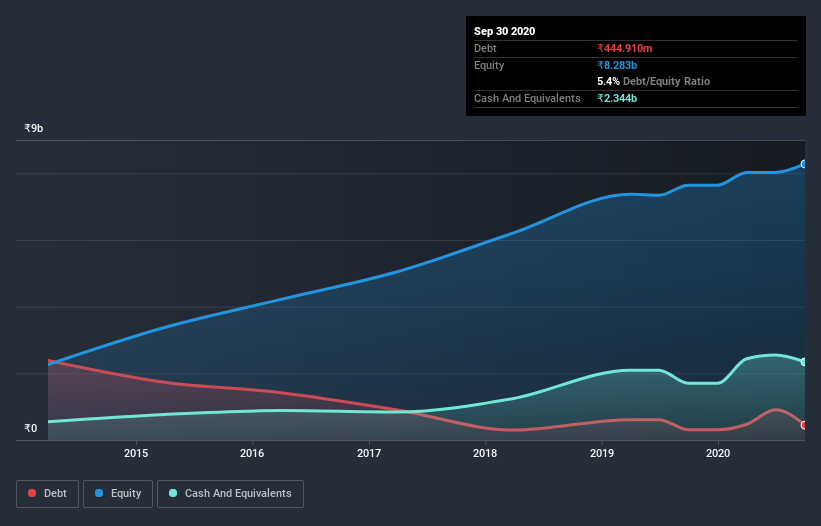- India
- /
- Construction
- /
- NSEI:AHLUCONT
These 4 Measures Indicate That Ahluwalia Contracts (India) (NSE:AHLUCONT) Is Using Debt Extensively

Legendary fund manager Li Lu (who Charlie Munger backed) once said, 'The biggest investment risk is not the volatility of prices, but whether you will suffer a permanent loss of capital.' So it might be obvious that you need to consider debt, when you think about how risky any given stock is, because too much debt can sink a company. As with many other companies Ahluwalia Contracts (India) Limited (NSE:AHLUCONT) makes use of debt. But the more important question is: how much risk is that debt creating?
Why Does Debt Bring Risk?
Generally speaking, debt only becomes a real problem when a company can't easily pay it off, either by raising capital or with its own cash flow. In the worst case scenario, a company can go bankrupt if it cannot pay its creditors. While that is not too common, we often do see indebted companies permanently diluting shareholders because lenders force them to raise capital at a distressed price. Of course, the upside of debt is that it often represents cheap capital, especially when it replaces dilution in a company with the ability to reinvest at high rates of return. When we think about a company's use of debt, we first look at cash and debt together.
See our latest analysis for Ahluwalia Contracts (India)
What Is Ahluwalia Contracts (India)'s Debt?
As you can see below, at the end of September 2020, Ahluwalia Contracts (India) had ₹444.9m of debt, up from ₹309.2m a year ago. Click the image for more detail. But on the other hand it also has ₹2.34b in cash, leading to a ₹1.90b net cash position.

How Strong Is Ahluwalia Contracts (India)'s Balance Sheet?
The latest balance sheet data shows that Ahluwalia Contracts (India) had liabilities of ₹8.59b due within a year, and liabilities of ₹1.38b falling due after that. Offsetting these obligations, it had cash of ₹2.34b as well as receivables valued at ₹5.47b due within 12 months. So it has liabilities totalling ₹2.15b more than its cash and near-term receivables, combined.
Of course, Ahluwalia Contracts (India) has a market capitalization of ₹16.8b, so these liabilities are probably manageable. But there are sufficient liabilities that we would certainly recommend shareholders continue to monitor the balance sheet, going forward. Despite its noteworthy liabilities, Ahluwalia Contracts (India) boasts net cash, so it's fair to say it does not have a heavy debt load!
Shareholders should be aware that Ahluwalia Contracts (India)'s EBIT was down 43% last year. If that earnings trend continues then paying off its debt will be about as easy as herding cats on to a roller coaster. The balance sheet is clearly the area to focus on when you are analysing debt. But ultimately the future profitability of the business will decide if Ahluwalia Contracts (India) can strengthen its balance sheet over time. So if you want to see what the professionals think, you might find this free report on analyst profit forecasts to be interesting.
Finally, while the tax-man may adore accounting profits, lenders only accept cold hard cash. While Ahluwalia Contracts (India) has net cash on its balance sheet, it's still worth taking a look at its ability to convert earnings before interest and tax (EBIT) to free cash flow, to help us understand how quickly it is building (or eroding) that cash balance. Looking at the most recent three years, Ahluwalia Contracts (India) recorded free cash flow of 34% of its EBIT, which is weaker than we'd expect. That weak cash conversion makes it more difficult to handle indebtedness.
Summing up
Although Ahluwalia Contracts (India)'s balance sheet isn't particularly strong, due to the total liabilities, it is clearly positive to see that it has net cash of ₹1.90b. So although we see some areas for improvement, we're not too worried about Ahluwalia Contracts (India)'s balance sheet. When analysing debt levels, the balance sheet is the obvious place to start. But ultimately, every company can contain risks that exist outside of the balance sheet. For example, we've discovered 1 warning sign for Ahluwalia Contracts (India) that you should be aware of before investing here.
If you're interested in investing in businesses that can grow profits without the burden of debt, then check out this free list of growing businesses that have net cash on the balance sheet.
If you decide to trade Ahluwalia Contracts (India), use the lowest-cost* platform that is rated #1 Overall by Barron’s, Interactive Brokers. Trade stocks, options, futures, forex, bonds and funds on 135 markets, all from a single integrated account. Promoted
New: Manage All Your Stock Portfolios in One Place
We've created the ultimate portfolio companion for stock investors, and it's free.
• Connect an unlimited number of Portfolios and see your total in one currency
• Be alerted to new Warning Signs or Risks via email or mobile
• Track the Fair Value of your stocks
This article by Simply Wall St is general in nature. It does not constitute a recommendation to buy or sell any stock, and does not take account of your objectives, or your financial situation. We aim to bring you long-term focused analysis driven by fundamental data. Note that our analysis may not factor in the latest price-sensitive company announcements or qualitative material. Simply Wall St has no position in any stocks mentioned.
*Interactive Brokers Rated Lowest Cost Broker by StockBrokers.com Annual Online Review 2020
Have feedback on this article? Concerned about the content? Get in touch with us directly. Alternatively, email editorial-team (at) simplywallst.com.
About NSEI:AHLUCONT
Ahluwalia Contracts (India)
Operates as an engineering, procurement, and construction company in India.
Flawless balance sheet with solid track record.


